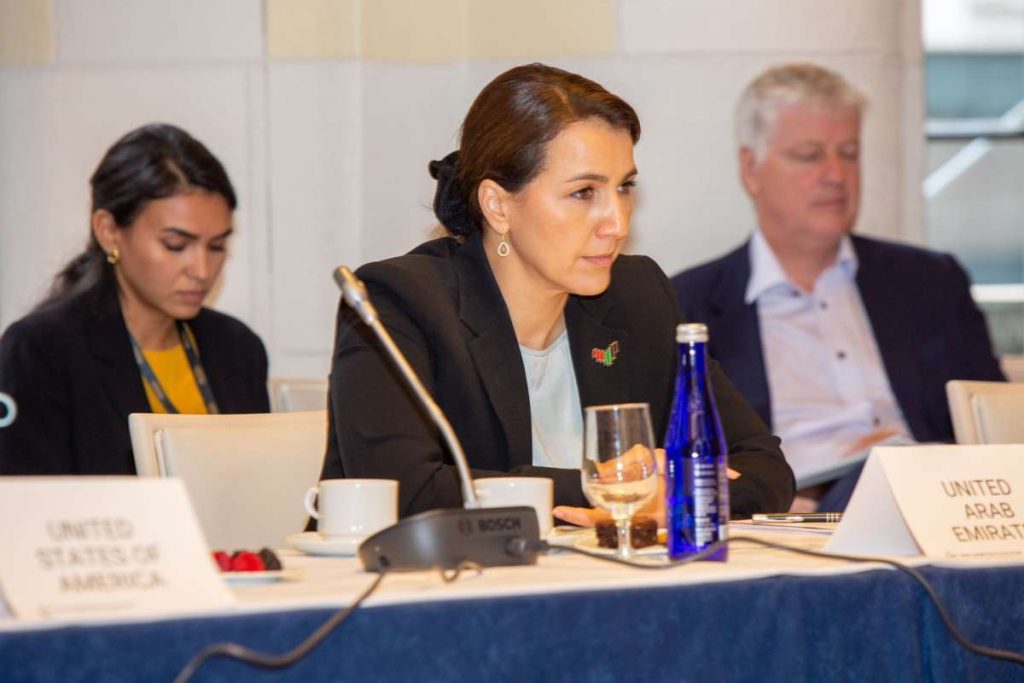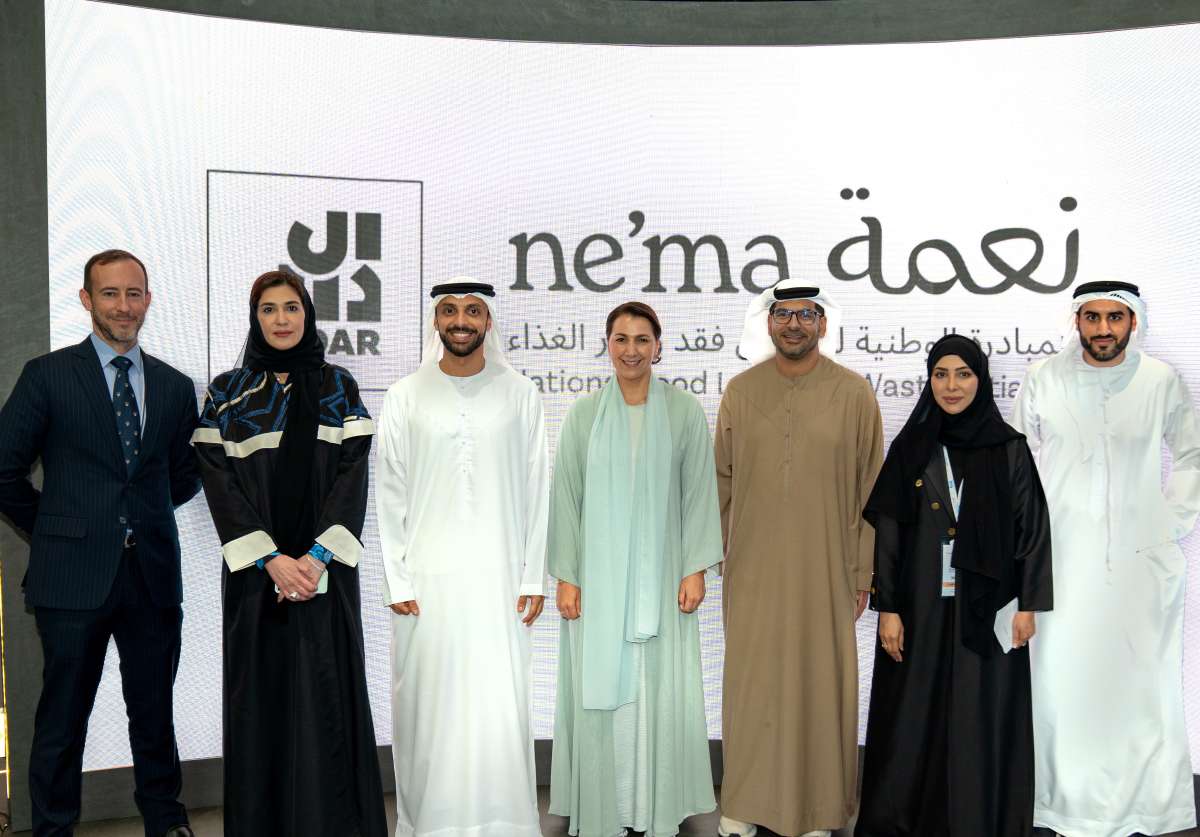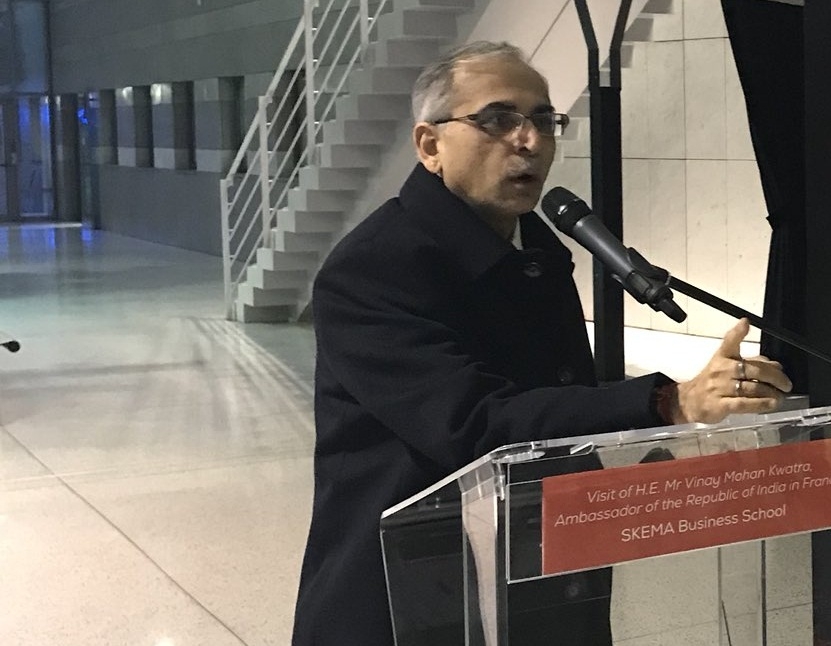The National Food Loss and Waste Initiative “ne’ma” and “Aldar” signed a Memorandum of Understanding (MoU) during Abu Dhabi Sustainability Week to mutually cooperate to tackle the issue of food loss and food waste in the UAE, and to contribute to achieving the National Food Security Agenda.
The MoU was signed in the presence of Mariam Mohammed Saeed Almheiri, UAE Minister of Climate Change and Environment; and was signed by Ahmed Al Shamsi, CEO of the Emirates Foundation, the key partner of ne’ma initiative, and Talal Al Dhiyebi, Group Chief Executive Officer at Aldar.
The signing ceremony took place at the Aldar pavilion at Abu Dhabi Sustainability Week in the presence of representatives from both ne’ma and Aldar.
ne’ma actively participated in several activities organized during Abu Dhabi Sustainability Week, the global platform that brings together senior officials and decision-makers, major business executives, NGOs, and global experts from around the world to discuss environmental issues and policies to face global challenges.
ne’ma was launched in February 2022 as the national umbrella to tackle food loss and waste, following a call to action by H.H. Sheikh Mohammed Bin Zayed Al Nahyan, UAE President, to address the improvidence in food and to develop a social norm that builds on the UAE’s culture and values of responsible and sustainable consumption.
It was established in collaboration between the Ministry of Climate Change and Environment and Emirates Foundation, which is mandated to consolidate and align national efforts to curb food loss and waste across the food value chain to meet the UAE’s commitment to the UN Sustainable Development Goals, especially SDG 12:3 which aims to reduce food waste by 50% by 2030.
Commenting on the MoU, Mariam Almheiri, Minister of Climate Change and Environment, stressed on the “significance of the MoU signed by ne’ma and Aldar, bolstering joint efforts to reduce food loss and waste through the cooperation of all national stakeholders.”

H.E. stressed the high cost of food waste on the environment, on human health, and on food security in general, reiterating that “we want to get people to think and reflect on their behavior around food to cherish this resource which we are privileged and blessed to have access to here in the UAE,” adding that more than 800 million people around the world suffer from hunger and that food waste is a collective global challenge.
“Therefore, we all have a role to take simple steps we can make into our daily routine that can reduce food waste and in return the negative impacts of climate change on our planet,” H.E. concluded.
The MoU provides that both parties shall facilitate and implement innovative solutions that can be scaled to introduce positive and sustainable change to reducing food waste, and design collaborative initiatives and projects across the food value chain with stakeholders from Aldar’s diverse business sectors to achieve the food waste reduction goals.
As part of the MoU, Aldar undertakes to support ne’ma pilot projects through Aldar schools, communities, hotels, and malls on Yas Island, raising awareness about the importance of reducing and segregating food waste and shifting people’s behaviors to more sustainable consumption habits.
Commenting on the MoU, Talal Al Dhiyebi, Group Chief Executive Officer at Aldar, said, “Our partnership with ne’ma is another opportunity for Aldar to contribute to a national sustainability priority and aligns perfectly with the principles of our recently launched net zero commitment. Food waste is a significant challenge and with assets across hospitality, retail, education, commercial, and residential we believe that this partnership will enable Aldar and our stakeholders to significantly reduce food waste that ends up in the landfill.”
Both entities will work together in the coming weeks to better define pilot projects that will be launched to raise awareness in the community and encourage behavioral change in food consumption and waste management habits, create a shift in social norms, and promote good stewardship of national resources.
With its own 2030 and 2050 goals of reaching Net Zero across its operations, Aldar is setting the benchmark for national real estate players in terms of sustainability and commitment to combat climate change. The company’s plan is to become Net Zero across its Scope 1, Scope 2, and Scope 3 greenhouse gas (“GHG”) emissions by 2050. Aldar has also set science-aligned 2030 interim targets, which will see it achieve Net Zero in its Scope 1 and Scope 2 GHG emissions and deliver a 45% reduction in the intensity of its Scope 3 GHG emissions relative to the company’s 2021 baseline.
Globally, it is estimated that one-third of the food produced (about 1.3 billion tonnes) is either lost at the various stages of production, processing, distribution, and retail or else wasted by food service providers and households. The impact of this ominous reality on the environment is quite hefty as wasted food that ends up in landfills accounts for 10 percent of global greenhouse gas emissions.
“We want to shape and spread an engaging and enticing vision for the future, making it a win for all sectors to practice food waste reduction,” said H.E. Ahmed Al Shamsi, CEO of the Emirates Foundation.
“We plan to look at ways of integrating technology and innovation to enhance efficiency and bring about cost savings as a result of food waste reduction, as well as explore policy areas that can create an enabling environment that positively impacts the food waste ecosystem,” Al Shamsi added.
H.E. concluded that “We are glad to work together with Aldar, the national partner, to achieve ne’ma’s goal of reducing food waste by 50% by 2030, and we think that this partnership will hopefully usher the way for other national partnerships.”
The MoU is expected to open the way for other partnerships between ne’ma and other major stakeholders within an aligned national endeavor to achieve ne’ma’s objective of 50% food waste reduction by 2030.








